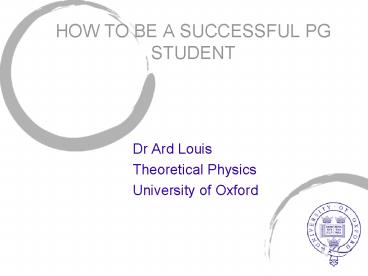HOW TO BE A SUCCESSFUL PG STUDENT PowerPoint PPT Presentation
Title: HOW TO BE A SUCCESSFUL PG STUDENT
1
HOW TO BE A SUCCESSFUL PG STUDENT
- Dr Ard Louis
- Theoretical Physics
- University of Oxford
2
- Advice from Peter Harrison and Mark Berner
- Time management
- Relationship with supervisor
- Form cohorts
- Participate in graduate seminars, even if it is
not exactly what you do - In 1st year it may all be quite uncertain.
- Pay attention to writing style guilds
3
(No Transcript)
4
outline
- A bit about me
- Tips on Oxford PG life
- Success in academic science?
5
Biological self-assembly
- Self-assembly of multi-component structures
- Can we understand?
- Can we emulate?
- (nano-science)
http//www.npn.jst.go.jp/ Keiichi Namba,
Osaka
6
Biological self-assembly
T3
T1
- Self-assembled from identical subunits
(capsomers). - Characteristic number T.
- Capsid T 12 pentamers, 10(T - 1) hexamers.
7
Self Assembly of computer viruses
Iain Johnston
8
Playing with legos?
9
outline
- A bit about me
- Tips on Oxford PG life
- Success in academic science?
10
Were not in Kansas anymore
- With the exception of a few professional degrees,
the majority of programmes at Oxford Uni
concentrate around research. - Undergrad you learn to consume knowledge
- Postgrad you learn to generate knowledge
11
Navigating the Oxford maze
- Get to know your supervisors
- You will learn more from fellow students than
from anyone else - The system is very informal and very flexible .
but hard to understand sometimes..
12
Navigating the Oxford maze
- Personal Challenges
- Loneliness
- Time management/stress
- The system
- Other students
13
Aim high! Have fun!
- It would be a supreme irony if a demanding
educational system served mainly to eliminate
many of the most talented. ... We don't need just
more facts. We do need more deep understanding.
... There is no money for simply sitting in the
library and thinking. - Thomas G. West (1997) In the Mind's Eye. New
York Prometheus books
14
outline
- A bit about me
- Tips on Oxford PG life
- Success in academic science?
15
1 Key to my success as a scientist Forming a
good team
16
?How do you become an academic supervisor?
The bad news
A sum rule Probability you will produce DPhil
students 1/( of DPhils per supervisor lifetime)
Ambition, focus, drive, passion,sacrifice ....
obsession?
David will probably not be an outstanding
philosopher, because he is too well-rounded and
interesting a person to succeed in academia,
lacking the single-minded obsession and personal
insensitivity that facilitates brilliant work. a
Princeton assessment of a philosophy PhD student
...
17
?How do you get there?
18
(No Transcript)
19
a few tips....
- Most important research skill
- Ask the right questions!
- why do you do what you do?
20
what is the big picture?
21
a few tips....
- Most important research skill
- Ask the right questions!
- why do you do what you do?
- Maximise your creativity
- know yourself
22
a few tips
- The first principle is that you must not fool
yourself--and you are the easiest person to fool.
So you have to be very careful about that. After
you've not fooled yourself, it's easy not to fool
other scientists. You just have to be honest in a
conventional way after that. -- R.P. Feynman,
Cargo Cult Science (1974) - http//www.physics.brocku.ca/etc/cargo_cult_scien
ce.html
23
a few tips
24
a few tips....
- Most important research skill
- Ask the right questions!
- why do you do what you do?
- Maximise your creativity
- know yourself
- Get out of the house/lab/department
- collaborate, talk to visitors, go to conferences
25
a few tips
- A DPHIL/MPHIL/MSc/M is training, not a life work
... - publish or perish .... (learn how to write)
- polish your talks .....
26
focus on getting results
27
Dont be too mercenary ...
28
Dont be too mercenary
- measures of success?
- publications in high impact journals, citation
counts, H index, - How much funding you brought in
- What committees you are on ....
- What is academic success?
- What is success in life?
29
Sharpen your axe

